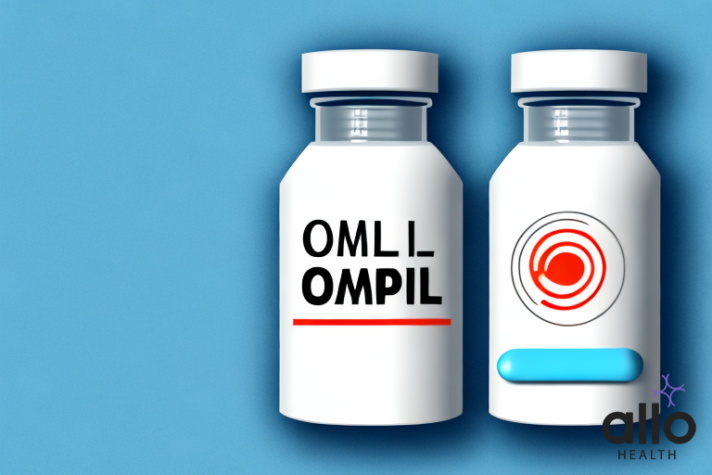Does Omeprazole Cause Erectile Dysfunction?

"The following blog article provides general information and insights on various topics. However, it is important to note that the information presented is not intended as professional advice in any specific field or area. The content of this blog is for general educational and informational purposes only.
Book consultation
The content should not be interpreted as endorsement, recommendation, or guarantee of any product, service, or information mentioned. Readers are solely responsible for the decisions and actions they take based on the information provided in this blog. It is essential to exercise individual judgment, critical thinking, and personal responsibility when applying or implementing any information or suggestions discussed in the blog."
If you are taking omeprazole for acid reflux or GERD, you may have heard rumors about its potential to cause erectile dysfunction (ED). While there is no denying that omeprazole is an effective medication for managing acid reflux, concerns about its adverse effects, specifically ED, persist among many people.
(ED). While there is no denying that omeprazole is an effective medication for managing acid reflux, concerns about its adverse effects, specifically ED, persist among many people.
Understanding Omeprazole and Its Effects on the Body
Omeprazole belongs to a class of medications known as proton pump inhibitors (PPIs) that reduce the amount of stomach acid production. Acid reflux and GERD (Gastroesophageal Reflux Disease) occur when stomach acid flows back into the esophagus, causing discomfort and irritation. Omeprazole helps alleviate these symptoms by reducing the amount of acid in the stomach, effectively decreasing the likelihood of acid reflux episodes and treating peptic ulcer disease.
In addition to treating acid reflux and GERD, omeprazole is also used to treat stomach ulcers and Zollinger-Ellison syndrome, a rare condition that causes the stomach to produce too much acid. It is also sometimes used in combination with antibiotics to treat Helicobacter pylori infections.
While omeprazole is generally considered safe and effective, it can have some side effects, including headaches, nausea, and diarrhea. Long-term use of PPIs like omeprazole has also been associated with an increased risk of joint pain, muscle spasms, bone fractures and vitamin B12 deficiency and erectile difficulties.
What is Erectile Dysfunction?
Erectile dysfunction refers to the inability to achieve or maintain an erection that is sufficient for sexual intercourse. This condition affects millions of men worldwide and can cause significant emotional distress. Although ED can occur at any age, it becomes more common as men age. The causes of ED can be varied, including psychological factors such as stress or anxiety, as well as physical factors like nerve damage or hormonal imbalances and even diseases like hypertension.
One of the most common physical causes of ED is cardiovascular disease. This is because the same processes that cause heart disease, such as atherosclerosis, can also affect blood flow to the penis. Certain drugs which have an impact on endothelial dysfunction can also have an impact on penile blood supply and hence the dysfunction.
The Link Between Omeprazole and Erectile Dysfunction
Study of erectile dysfunction done so far suggests a possible link between omeprazole use and erectile dysfunction. However, it is important to note that correlation does not necessarily imply causation. Other factors, such as age, medical history, and lifestyle, can also contribute to the development of ED. Therefore, it remains unclear whether omeprazole directly causes ED.
Despite the lack of conclusive evidence, it is still important for individuals taking omeprazole to be aware of the potential risk of developing ED. It is recommended that patients discuss any concerns with their healthcare provider and explore alternative treatment options if necessary.
Furthermore, omeprazole is not the only medication that has been linked to ED. Other drugs, such as antidepressants and blood pressure medications, have also been associated with this condition. Therefore, it is crucial for patients to inform their healthcare provider of all medications they are taking to ensure proper management of their health.
Potential Mechanisms Behind Omeprazole-Induced Erectile Dysfunction
While the exact mechanism behind omeprazole-induced ED is not yet clear, experts have suggested that it may be related to the medication’s effects on nitric oxide levels in the body. Nitric oxide is a compound that plays a crucial role in achieving and maintaining an erection. PPIs like omeprazole may interfere with the proper functioning of nitric oxide, potentially leading to ED.
Another potential mechanism behind omeprazole-induced ED is its effect on testosterone levels. Testosterone is a hormone that is essential for sexual function in men. Studies have shown that long-term use of PPIs like omeprazole can lead to a decrease in testosterone levels, which may contribute to ED.
In addition, omeprazole may also affect the absorption of certain nutrients that are important for sexual health, such as magnesium and vitamin B12. Low levels of these nutrients have been linked to ED and other sexual dysfunction in men. Therefore, it is possible that omeprazole-induced ED may be related to a deficiency in these nutrients.
Who is at Risk for Developing Erectile Dysfunction from Omeprazole Use?
Although anyone who takes omeprazole could potentially develop ED, certain groups of people may be at a higher risk. For example, men who are already at risk of developing ED due to age or other medical conditions may be more susceptible to omeprazole-induced ED.
Additionally, studies have shown that long-term use of omeprazole may increase the risk of developing ED. This is because omeprazole can interfere with the body’s ability to absorb certain nutrients, such as magnesium, which are important for maintaining healthy blood flow and nerve function in the penis.
Symptoms of Erectile Dysfunction Caused by Omeprazole
The symptoms of omeprazole-induced ED are no different from any other type of ED and may include difficulty achieving or maintaining an erection, decreased sexual desire, and decreased sexual satisfaction.
Treatment Options for Omeprazole-Induced Erectile Dysfunction
If you suspect that your use of omeprazole is causing ED, it is crucial to speak with your doctor. They may recommend alternative medications to manage your acid reflux, or they may prescribe medications to treat your ED specifically.
In addition to medication changes, there are also lifestyle changes that can help improve ED symptoms. Regular exercise, a healthy diet, and stress management techniques such as meditation or therapy can all contribute to better sexual function.
It is important to note that omeprazole-induced ED is a relatively rare side effect, and there may be other underlying causes for your symptoms. Your doctor may recommend further testing or refer you to a specialist to determine the root cause of your ED.
Preventing Erectile Dysfunction While Taking Omeprazole
It may be possible to prevent ED while taking omeprazole by making certain lifestyle changes. Some tips include maintaining a healthy diet, exercising regularly, managing stress, and quitting smoking.
In addition to lifestyle changes, it is important to talk to your doctor about any concerns you may have regarding erectile dysfunction while taking omeprazole. Your doctor may be able to adjust your medication or prescribe additional treatments to help prevent ED.
Alternatives to Omeprazole for Treating Acid Reflux and GERD
There are several alternative medications available to treat acid reflux and GERD. These include H2 blockers, antacids, and lifestyle modifications such as avoiding trigger foods and elevating the head of the bed while sleeping.
In addition to medication and lifestyle changes, some people find relief from acid reflux and GERD through alternative therapies such as acupuncture, herbal remedies, and meditation. However, it is important to consult with a healthcare professional before trying any alternative treatments.
Talking to Your Doctor About Omeprazole Adverse Reactions
If you are concerned about the potential side effects of omeprazole, including ED, it is important to speak with your doctor. They can help you weigh the risks and benefits of using omeprazole and recommend alternative treatments if needed.
It is important to note that not everyone who takes omeprazole will experience side effects, and those who do may not experience all of the potential side effects. However, if you do experience any side effects, including ED, it is important to bring it up with your doctor as soon as possible.
Additionally, it is important to follow the prescribed dosage and not exceed it, as this can increase the risk of undesired health concerns. Your doctor may also recommend lifestyle changes, such as dietary modifications or stress reduction techniques, to help manage your symptoms and reduce the need for medication.
Managing Other Potential Side Effects of Omeprazole
Aside from ED, omeprazole may also cause other side effects, such as headaches, nausea, and diarrhea. The response in pediatric patients and elderly patients is exaggerated and different when compared to the young population due to which, they should be more cautious with taking unsupervised medications. It is essential to speak with your doctor if you experience any side effects while taking this medication.
Treatment with omeprazole increases the oxidative stressors in the body causing stress responses from various body systems. Some patients suffer from acute attacks of stomach pain and self administer PPIs without consulting a doctor leading to excessive dosage of PPI and wrong mis treatment even when the condition is not due to gastric upset.
In addition to the aforementioned side effects, omeprazole may also increase the risk of bone fractures, particularly in individuals who take high doses of the medication for extended periods. It is important to discuss any concerns about bone health with your doctor, especially if you have a history of osteoporosis or other bone disorders.
A complaint of a feeling of discomfort is seen in patients who use PPIs as a part of their chronic treatment which is not advised. Concomitant treatment with additional drugs of the antacid class also should not be taken with Omeprazole since they do more harm when taken together as chronic treatment. The required drug information is correctly delivered by a healthcare professional and hence a medical consult is advised before resuming or changes in any drugs in treatment formulation.
Conclusion: Weighing the Risks and Benefits of Using Omeprazole
While concerns about omeprazole-induced ED are valid, it is crucial to consider the full picture before making any changes to your medication regimen. Omeprazole can be an effective medication for managing acid reflux and GERD, but it may also have side effects around affecting the sexual ability, including the potential for ED. Speak with your doctor about your concerns and take steps to maintain a healthy lifestyle to minimize your risk of developing ED while taking omeprazole.
It is important to note that not everyone who takes omeprazole will experience ED. In fact, the risk of developing ED while taking omeprazole is relatively low. Additionally, there are alternative medications and lifestyle changes that can be considered if ED does occur.
Furthermore, it is important to weigh the benefits of taking omeprazole for acid reflux and GERD against the potential risks. Untreated acid reflux and GERD can lead to complications such as esophagitis, ulcers, and even esophageal cancer. Therefore, it is important to work with your doctor to find the best treatment plan for your individual needs.
Most Asked Questions
-
Are Jamaican herbs effective in treating erectile dysfunction?
This FAQ can address the effectiveness of Jamaican herbs and remedies in improving erectile function, based on available research and testimonials.
-
Are all antihistamines linked to erectile dysfunction?
No, not all antihistamines are linked to erectile dysfunction. Some, like desloratadine and loratadine, have shown potential benefits in improving sexual function. The impact depends on the specific type of antihistamine and its receptor activity.
-
Are there alternative treatments for Erectile Dysfunction (ED)?
Depending on the cause, erectile dysfunction can be cured. Some causes of Erectile Dysfunction (ED) are easier to cure than others. A medical or psychological evaluation may be necessary to reach the right diagnosis and treatment. Medications may also be prescribed along with psychological intervention.
-
Are There Any Risks or Side Effects Associated with Using Apple Cider Vinegar for Erectile Dysfunction?
Yes, there are potential risks and side effects associated with using apple cider vinegar. These include possible tooth enamel erosion, digestive irritation, and interactions with medications. It's crucial to use ACV in moderation, dilute it properly, and consult with a healthcare professional before incorporating it into your routine, especially if you have pre-existing health conditions or are taking medications.
-
Are There Any Side Effects of Using Lion's Mane for Erectile Dysfunction?
Lion's Mane is generally considered safe for most people, with few reported side effects. However, individuals may experience mild gastrointestinal issues or allergic reactions. It's crucial to start with a lower dosage, monitor your body's response, and consult with a healthcare professional if you have concerns or pre-existing health conditions.







































